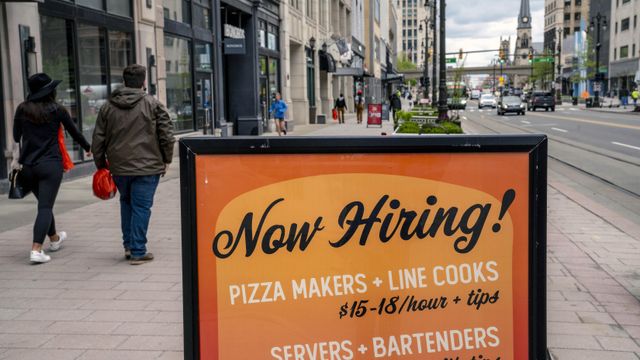Are unemployment checks to blame for poor jobs report?
Many business owners and Republican leaders are blaming hiring shortages and slow job growth on federal pandemic benefits they say are too generous. Democrats - and many economists - say the answer isn't that simple.
Posted — UpdatedIn fact, Montana's Republican Gov. Greg Gianforte said this week that his state would no longer accept the additional federal jobless benefits because he believes they're the reason behind his state's worker shortage.
"I don't think the additional unemployment benefits have anything to do with the problem," said Democratic 4th District Congressman David Price, who voted to extend federal jobless benefits to September.
"I know it's still a talking point in Republican circles, but there's no evidence whatsoever that it's true," Price said. "The states that have the higher unemployment benefits, you would expect, according to these talking points, you'd expect them to have slower job growth, right? And that's not true at all."
North Carolina has one of the least generous unemployment programs in the country, with an average benefit of around $235 a week for no more than 16 weeks. Most applicants who lost jobs due to the pandemic last year have run through those benefits already.
The current federal pandemic jobless benefit check is $300 a week. A full-time worker making North Carolina's minimum wage of $7.25 an hour earns just $290 a week. So, the very lowest-paid workers may be better off staying home, at least until the federal checks stop in September, said Mike Walden, an economic at North Carolina State University.
But, Walden noted, most workers make more than minimum wage, and higher-paying sectors also saw weak job growth. He said several other factors may play a larger role, including current problems with the global supply chain.
"We're still not back to normal, which means a lot of supplies are not getting to businesses that need those supplies," he said. "So, if they can't get the supplies, they they won't hire people."
Walden added that some workers may not be coming back because they’ve moved on to other jobs. Others may want to work but are still stuck at home with children in remote learning.
Price agreed with Walden's assessment.
"Ask yourself, who isn't returning to these jobs, or who isn't taking these jobs?" Price said. "It is disproportionately women. It is disproportionately people who do not yet have reliable child care, who do not yet reliably have the schools open all the time, and who who may have lingering health concerns."\
"The most certain way through this is to stay the course. With respect to helping people tide themselves over with unemployment benefits, that's not the issue," Price added. "We've got to get people vaccinated, we've got to get this economy back."
Walden said he thinks the April jobs report is just a blip in the overall trajectory toward recovery. But, he added, for some low- and middle-wage workers, the post-pandemic economy is going to look very different.
"Many jobs are going to be redefined by businesses. They're probably going to be adding more technology, in particular, and so there's probably a lot of folks out there who just don't have the skills to go back to the kinds of jobs that they had before," he said. "That's the most worrisome, because that means we're going to have a gap in skills."
Additionally, he said, entire industries like food processing that were hit hard by the pandemic could move to more automation, shedding thousands of jobs in the state.
North Carolina needs to anticipate where those changes could come and target them for retraining efforts, apprenticeships or community college programs to help refit them for the post-pandemic workforce, Walden said, adding that he thinks North Carolina could be a national leader in that push.
"We have a history of a can-do attitude, and we have great training institutions, we have great businesses who are willing to help," he said. "I think we really need to watch that and focus on that."
• Credits
Copyright 2024 by Capitol Broadcasting Company. All rights reserved. This material may not be published, broadcast, rewritten or redistributed.





